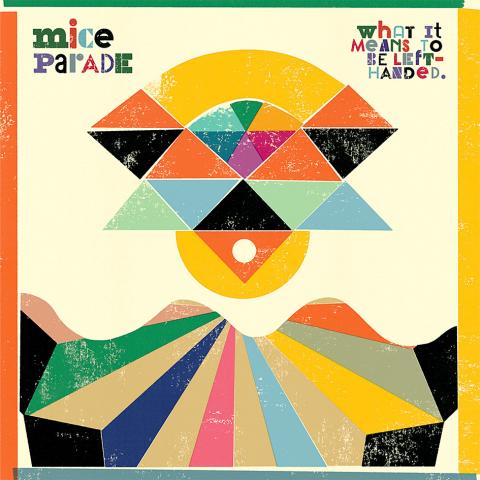Belle and Sebastian
Write About Love
Rough Trade Records

Over the course of the band’s 15-year career, Belle and Sebastian has consistently delivered memorable albums teeming with meditative indie-pop sing-alongs. Despite its longevity, the band has never strayed very far from the formula that first made it successful: pensive lyrics and playful melodies stretched across chipper, propulsive rhythms and deceptively simple, highly nuanced instrumentation.
The band’s new record, Write About Love, gives us more of the same — and there is no reason to complain. From the opening bars of I Didn’t See It Coming, it is clear the band is still treading on fertile ground. A simple, punchy beat, a syrupy vocal hook, some elegant guitar work — all building to a swirling climax enveloping the listener in rich, sparkly tones.
One of the reasons this album stands out from previous Belle and Sebastian releases is that lead singer and songwriter Stuart Murdoch shares the mic with his bandmates more frequently than ever before. The band has often made occasional use of angelic female voices (most notably that of Isobel Campbell, who left in 2002) to lend certain songs a wispy feel, but here there are harmonies and counter melodies being sung on nearly every track.

Norah Jones even makes an appearance on Little Lou, Ugly Jack, Prophet John, a duet about dreamy love faltering in the light of day. Though I would have never thought to match Murdoch’s voice Jones’, they work surprisingly well with church organs and simple, soulful guitar as a backdrop.
Though by no means Belle and Sebastian’s best release, Write About Love should certainly enjoy some staying power in the playlists of indie rock nerds the world over.
Gold Panda

Lucky Shiner
Ghostly International
Gold Panda very quickly found a special place in the hearts of critics with a string of singles and EPs last year. His debut full-length release, Lucky Shiner, is likely to further endear him to them, as well as expand his listening audience.

The opening track, You, features a warbly, highly textured bass sound, a thumping beat (think Closer by Nine Inch Nails) and a sampler rhythmically spitting out high-pitched samples of the words “you” and “me.” This imaginative layering of samples atop lush production is a Gold Panda staple, and the entire album is built around the same basic framework.
Samplers aren’t anything new, but it is unusual to hear an artist rely so heavily on one, and to be so obvious about it. It sounds like a recipe for disaster, but works marvelously on Lucky Shiner. Although many of the sounds are unusual, they are all neatly contextualized within familiar, well-wrought trip-hop and dub soundscapes.
Panda spent time living in East Asia, and on Lucky Shiner he samples many sounds from traditional Eastern music, though they are often manipulated and distorted beyond recognition. On Same Dream China, however, strains of a plucked stringed instrument, distinctly Asian, are occasionally permitted to shine through the mix of layered bells and laid-back beats. The effect is charming, making Same Dream China one of the album’s truly standout tracks.
Gold Panda may not be a pioneer, but this is a truly substantial debut. Expect more coming down the pipeline soon.
Mice Parade
What It Means to Be Left-Handed
Fat Cat
Over the past 12 years, the revolving cast of Mice Parade has assumed various guises, producing music ranging from IDM to indie-pop, though always held together by multi-instrumentalist Adam Pierce (primarily a percussionist). The band’s most recent offering, What It Means to Be Left-Handed, is its most polished and accessible record to date — a joyful romp through ethnic-tinged indie rock.
Album opener Kupanda features hand drums and a happily chiming West African harp, appropriately setting the tone for a record that isn’t shy about incorporating world music influences into its palette of sounds. It’s a sunny-side-up kind of track — an excellent way to begin a day you know is going to turn out right.
At times, the album hearkens back to the halcyon days of indie rock. The nonchalant vocal delivery on Even instantly brings to mind memories of Lou Barlow from Sebadoh, and a cover of the Lemonheads song Mallo Cup is included for good measure, squarely targeting that early-to-mid-1990s indie sweet spot, occupying a space somewhere between lo-fi grit and jangly pop.
Tokyo Late Night is another winner, a clever wrap of piano chords, organ synths and snappy percussion, to which is added a dash of Latin-flavored guitar, creating a feel akin to that of Gotan Project’s work.
The record, however, has its share of lackluster moments. In particular, one has to wonder how the ambient track Remember the Magic Carpet made the cut, as it seems out of place on an album of pop songs, serving no purpose either as a standalone track or as a link between other songs.
But despite the occasional misstep, What It Means to Be Left-Handed remains a solid record that’s worth a spin.
Brian McBride
The Effective Disconnect
Kranky
Brian McBride is best known as half of Stars of the Lid, one of the premier ambient drone bands of the past 15 years. He is also a debate coach at the University of Southern California and is working on his PhD from Northwestern. It’s amazing, then, that he’s found the time to release his second solo album, The Effective Disconnect.
The theme for the album is the decline of honeybee populations around the world (recently linked to a combination of a fungus and a virus). As you might expect from an ambient artist, however, excepting the occasional buzzing of bees, the link between the source material and McBride’s abstraction is far from obvious, and ultimately it is up to the listener to create his or her own internal story to accompany the sounds.
Ambient music relies heavily on texture, and McBride has always proven himself to be extremely adept at creating buoyant, fecund atmospherics in his songs, often making use of “found” sounds — recorded from daily life — in engaging ways.
Yet the dominant source material here comes from samples of stringed instruments. In fact, it could be argued that Chamber Minuet, with its highly melodic strings and relatively fast chord changes, veers pretty far from what would traditionally be considered ambient.
This kind of music certainly isn’t for everyone, and oftentimes even fans of the genre will require a particular mood to truly connect with it. If mournful, nebulous soundscapes are your cup of tea, however, The Effective Disconnect will be appreciated.

Nine Taiwanese nervously stand on an observation platform at Tokyo’s Haneda International Airport. It’s 9:20am on March 27, 1968, and they are awaiting the arrival of Liu Wen-ching (柳文卿), who is about to be deported back to Taiwan where he faces possible execution for his independence activities. As he is removed from a minibus, a tenth activist, Dai Tian-chao (戴天昭), jumps out of his hiding place and attacks the immigration officials — the nine other activists in tow — while urging Liu to make a run for it. But he’s pinned to the ground. Amid the commotion, Liu tries to

A dozen excited 10-year-olds are bouncing in their chairs. The small classroom’s walls are lined with racks of wetsuits and water equipment, and decorated with posters of turtles. But the students’ eyes are trained on their teacher, Tseng Ching-ming, describing the currents and sea conditions at nearby Banana Bay, where they’ll soon be going. “Today you have one mission: to take off your equipment and float in the water,” he says. Some of the kids grin, nervously. They don’t know it, but the students from Kenting-Eluan elementary school on Taiwan’s southernmost point, are rare among their peers and predecessors. Despite most of

A pig’s head sits atop a shelf, tufts of blonde hair sprouting from its taut scalp. Opposite, its chalky, wrinkled heart glows red in a bubbling vat of liquid, locks of thick dark hair and teeth scattered below. A giant screen shows the pig draped in a hospital gown. Is it dead? A surgeon inserts human teeth implants, then hair implants — beautifying the horrifyingly human-like animal. Chang Chen-shen (張辰申) calls Incarnation Project: Deviation Lovers “a satirical self-criticism, a critique on the fact that throughout our lives we’ve been instilled with ideas and things that don’t belong to us.” Chang

Feb. 10 to Feb. 16 More than three decades after penning the iconic High Green Mountains (高山青), a frail Teng Yu-ping (鄧禹平) finally visited the verdant peaks and blue streams of Alishan described in the lyrics. Often mistaken as an indigenous folk song, it was actually created in 1949 by Chinese filmmakers while shooting a scene for the movie Happenings in Alishan (阿里山風雲) in Taipei’s Beitou District (北投), recounts director Chang Ying (張英) in the 1999 book, Chang Ying’s Contributions to Taiwanese Cinema and Theater (打鑼三響包得行: 張英對台灣影劇的貢獻). The team was meant to return to China after filming, but